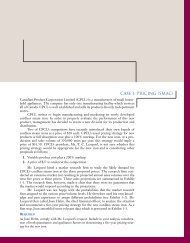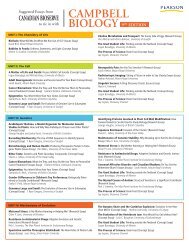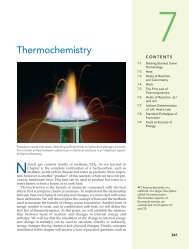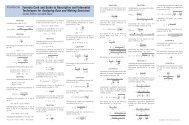Groups and Teamwork - Pearson Canada
Groups and Teamwork - Pearson Canada
Groups and Teamwork - Pearson Canada
Create successful ePaper yourself
Turn your PDF publications into a flip-book with our unique Google optimized e-Paper software.
A Common Purpose<br />
Effective teams have a common <strong>and</strong> meaningful purpose that provides direction, momentum,<br />
<strong>and</strong> commitment for members. 80 This purpose is a vision. It’s broader than specific<br />
goals.<br />
The New Brunswick government’s former Department of Economic Development <strong>and</strong><br />
Tourism illustrates how a common purpose can empower employees. The department’s<br />
vision statement, which included the m<strong>and</strong>ates “Help create jobs for our fellow New<br />
Brunswickers” <strong>and</strong> “Do things well or not at all,” inspired some of its employees to<br />
develop strategies to attract telemarketing firms to New Brunswick. When the provincial<br />
government agreed to provide the employees with only half of the anticipated $100 000<br />
needed to implement their strategy, the employees didn’t give up. Instead, they successfully<br />
approached NB Tel for the other $50 000. Less than a year later, telemarketing<br />
<strong>and</strong> call centres became the fastest-growing sector in New Brunswick. 81 By 2002, New<br />
Brunswick’s call centre industry employed 16 000, more than the province’s forestry<br />
industry, which historically was the largest employer. 82<br />
Members of successful teams put a tremendous amount of time <strong>and</strong> effort into discussing,<br />
shaping, <strong>and</strong> agreeing upon a purpose that belongs to them both collectively<br />
<strong>and</strong> individually. This common purpose, when accepted by the team, becomes the<br />
equivalent of what celestial navigation is to a ship captain—it provides direction <strong>and</strong> guidance<br />
under any <strong>and</strong> all conditions.<br />
Chapter 5 <strong>Groups</strong> <strong>and</strong> <strong>Teamwork</strong> 201<br />
NB Tel<br />
www.nbtel.nb.ca<br />
cohesiveness<br />
Degree to which team members are<br />
attracted to each other <strong>and</strong> are<br />
motivated to stay on the team.<br />
A recent study of 23 National<br />
Basketball Association teams<br />
found that “shared experience”—<br />
tenure on the team <strong>and</strong> time on<br />
court—tended to improve turnover<br />
<strong>and</strong> boost win-loss performance<br />
significantly. Why do you think<br />
teams that stay together longer<br />
tend to play better?<br />
productivity. 86<br />
Specific Goals<br />
Successful teams translate their common purpose into specific, measurable, <strong>and</strong> realistic<br />
performance goals. Just as we demonstrated in Chapter 4 how goals lead individuals to<br />
higher performance, goals also energize teams. These specific goals facilitate clear communication.<br />
They also help teams maintain their focus on achieving results.<br />
Consistent with the research on individual goals,<br />
team goals should be challenging. Difficult goals have<br />
been found to raise team performance on those criteria<br />
for which they’re set. So, for instance, goals for quantity<br />
tend to raise quantity, goals for speed tend to raise<br />
speed, goals for accuracy raise accuracy, <strong>and</strong> so on. 83<br />
Teams should also be encouraged to develop milestones—tangible<br />
steps toward completion of the project.<br />
This allows teams to focus on their goal <strong>and</strong> evaluate<br />
progress toward the goal. The milestones should be sufficiently<br />
important <strong>and</strong> readily accomplished so that<br />
teams can celebrate some of their accomplishments<br />
along the way.<br />
Team Efficacy<br />
Effective teams have confidence in themselves. They<br />
believe they can succeed. We call this team efficacy. 84<br />
Success breeds success. Teams that have been successful<br />
raise their beliefs about future success which, in<br />
turn, motivates them to work harder. One of the factors<br />
that helps teams build their efficacy is cohesiveness—<br />
the degree to which members are attracted to each<br />
other <strong>and</strong> are motivated to stay on the team. 85 Though<br />
teams differ in their cohesiveness, it is important<br />
because it has been found to be related to the team’s

















